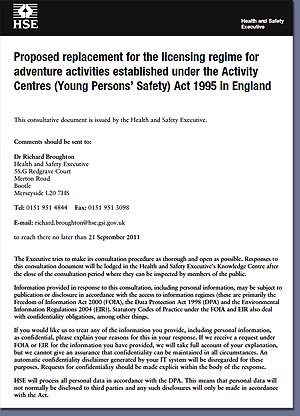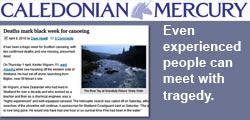Low Risk Criteria Applied By HSE To Young Persons Adventure Activities
The HSE is starting to apply the Government’s criteria of low risk based on the fact that no prosecutions have taken place in the specific area of activity or workplace concerned.
Alarm bells will no doubt start to ring in the ears of health and safety professionals, Union Safety Reps and the Trade Unions, if the fact that there has not been any prosecutions as being the criteria for selecting a specific activity as being low risk! But this is the case with so-called adventure activities undertaken by schools.
Given the poor record of prosecutions by the HSE, and the slashing of HSE resources, and now the attempt to decimate H&S legislation; the numbers of people being injured and even killed at work and even within the leisure industry is set to increase.
 The Activity Centres (Young Persons’ Safety) Act 1995 (“the 1995 Act”) was introduced following the death in March 1993 of four teenagers whilst canoeing at an activity centre in Lyme Bay, Dorset. The Act imposes requirements relating to safety, presently set out in the Adventure Activities Licensing Regulations 2004 (AALR), which requires that paid provision of four defined adventure activities (trekking, water sports, caving and climbing) for young persons less than 18 years old be licensed.
The Activity Centres (Young Persons’ Safety) Act 1995 (“the 1995 Act”) was introduced following the death in March 1993 of four teenagers whilst canoeing at an activity centre in Lyme Bay, Dorset. The Act imposes requirements relating to safety, presently set out in the Adventure Activities Licensing Regulations 2004 (AALR), which requires that paid provision of four defined adventure activities (trekking, water sports, caving and climbing) for young persons less than 18 years old be licensed.
The following extract from the report Common Sense, Common Safety explains the reasons for recommending the abolition of licensing:
“the licensing regime is seen as a cost and burden on business that adds little to the health and safety of young people undertaking adventure activities. The HSE believes that effective enforcement of the 1974 Act and the Management of Health and Safety at Work Regulations is sufficient. The licensing regime is narrowly focussed on a limited number of outdoor activities and does not reflect the wide range of adventure activities now available.
The running costs of the scheme are around £750,000 and the cost of a licence is £715. This seems to me to be a disincentive to new entrants to the adventure activity market, especially to small companies.
I would recommend that we abolish the licensing of adventurous activities through the Adventure Activities Licensing Authority and instead introduce a code of practice that the HSE will oversee and monitor. The HSE should also ensure that those planning trips can feel confident that a provider is compliant with the code. Since this is a devolved issue, I will work with the devolved administrations on taking forward this initiative in Scotland and Wales.
There are no additional costs associated with the repeal of relevant legislation. Removal of licensing would allow businesses to make financial savings and focus on management of the whole range of available activities. In addition, there would be savings associated with the dismantling of the licensing regime.”
The Tory led Con-Dem(ned) Government accepted the recommendation on 15 October 2010
From this it can be clearly seen that the government policy is to wait until death occurs before legislating for proper controls of the risk of death and injury from a specific activity. They are totally blind, by dogma, to the correlation between licensing and the risk control of this activity and the lack of further deaths and serious injuries.
This is just a small example of what happens when things go wrong:
Simon Dunne, Claire Langley and Rachel Walker, all 16, and Dean Sayer, 17, drowned on a canoeing trip to Lyme Bay, Dorset, in March 1993. They were pupils at Southway comprehensive in Plymouth. Peter Kite, head of the activities centre, served 14 months for manslaughter caused by gross negligence.
In October 2000 Rochelle Cauvet, 14, and Hannah Black, 13, died on a trip to the Yorkshire Dales. The pair, from Royds High School in Leeds, were attempting to walk through Stainforth Beck under teacher supervision. An inquest returned a verdict of accidental death; Leeds City Council was fined £30,000.
Amy Ransom, 17, died when she fell down a ravine on a mountain trek in Vietnam in July 2001. Eight pupils and a teacher from Wycombe High School were travelling with World Challenge Expeditions. An inquest ruled accidental death.
In August 2001 Amelia Ward, 16, died in an accident when she was hit by a boulder during an abseiling trip to South Africa with company Outpost.
In May 2002, 10-year-old Max Palmer drowned when he jumped into Glenridding Beck, Cumbria, during a trip with Fleetwood High School. Geography teacher Paul Ellis was jailed for 12 months for manslaughter. The Health and Safety Executive called him an 'unsuitable leader'.
According to this HSE press release issued last week:
Outdoor activity providers, sports clubs and teachers are among those being asked for their views on proposals to change the health and safety requirements for young people's adventure activities.
The Adventure Activities Licensing Authority (AALA) will be abolished, and a 12-week long public consultation on its replacement with a code of practice begins today.
The current arrangements for regulating adventure activities require that providers of activities for under-18s in four areas - caving, climbing, trekking and water sports - have a licence issued by AALA before they can operate.
Safety performance in the sector is good and there have been no prosecutions brought under the Adventure Activities Licensing Regulations 2004.
On this basis, HSE considers the provision and use of adventure activities to be low risk.
Peter Brown, HSE's programme lead for AALA, said:
"The aim of these proposals is to reduce bureaucracy whilst still ensuring that outdoor activities providers meet their health and safety responsibilities to those taking part and their employees. However, we want to hear from those who have first hand experience of the regime to guide us in what final plans should be taken forward."
The recommendation to abolish AALA and the associated regulations was made in the Government-commissioned report Common Sense, Common Safety.
 The current licensing regime operates under the Activity Centres (Young Persons' Safety) Act 1995 and the Adventure Activities Licensing Regulations 2004.
The current licensing regime operates under the Activity Centres (Young Persons' Safety) Act 1995 and the Adventure Activities Licensing Regulations 2004.
Young people taking part in adventure activities are already protected by the Health and Safety at Work Act 1974 (HSWA) and Management of Health and Safety at Work Regulations 1999. The licensing regime essentially duplicates that protection but covers only the four specified adventure activities.
The new code of practice will help providers understand how to comply with legal requirements under HSWA.
Subject to the outcome of the consultation, it could take the form of a statement of general principles applicable to all existing and emerging activities, or be more specifically aimed at a narrower range of activities.
The code will sit above existing non-statutory schemes such as those run by some national governing bodies (NGBs). The consultation includes consideration of the degree to which participation in an NGB scheme should be taken as sufficient reassurance of safety standards.
In seeking public involvement in the consultation period, the HSE have issued an email request via its news team:
The Consultation Document sets out proposals for replacement arrangements for adventure activities. Replacement arrangements are needed to implement the recommendation in the report Common Sense Common Safety to abolish the licensing of four specified adventure activities by the Adventure Activities Licensing Authority, which will occur following the necessary legislative change at a later date.
The questions on the general characteristics of future arrangements will be of interest to providers of adventure activities, as well as their clients and others with an interest.
The consultation closes on 21 September 2011.
You can take part in the consultation exercise here
Source: HSE / The Observer



